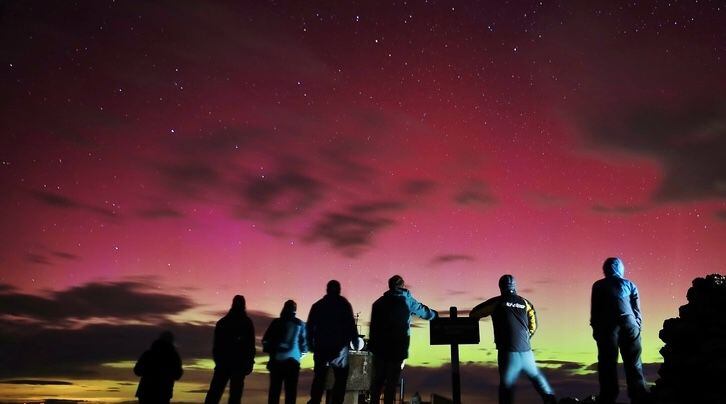In a stunning celestial display, the northern lights, or aurora borealis, illuminated the skies over Massachusetts on Thursday night, captivating sky-gazers with vibrant colors typically reserved for regions further north. This rare phenomenon was a result of a geomagnetic storm, which occurs when solar material and magnetic fields erupt from the sun and interact with Earth’s atmosphere.
This spectacle marked the second time this year that the northern lights have been visible in Massachusetts, a state not commonly associated with such phenomena. Experts attribute these unusual sightings to the sun reaching the peak of its 11-year solar cycle, a period characterized by increased solar activity.
What Caused the Aurora Borealis?
The remarkable visibility of the northern lights in Massachusetts was primarily due to a severe geomagnetic storm. According to the National Oceanic and Atmospheric Administration (NOAA), these storms can significantly disrupt the Earth’s magnetic field, allowing the auroras to travel further south than usual.
The solar event responsible for this display occurred when a massive eruption on the sun expelled solar material, which then collided with Earth’s magnetic field. This interaction resulted in the vibrant colors seen across much of the northern half of the United States, including the Bay State. NOAA noted that “watches at this level are very rare,” underscoring the exceptional nature of this event.
A Second Chance for Sky-Gazers
With Thursday’s event still fresh in the minds of sky-watchers, many are left wondering: will there be another opportunity to view the northern lights this weekend?
As of Friday, NOAA has provided forecasts that suggest Massachusetts will not be in the prime viewing zone for the aurora borealis over the weekend. The predictions indicate that while the northern lights may be visible as far south as the northwestern United States, the likelihood of sightings diminishes significantly in the northeastern part of the country.
On Friday night, the aurora is expected to be seen primarily in Canada and Alaska, with possible glimpses in the northern parts of New Hampshire, Vermont, and Maine. However, Saturday night’s forecasts indicate that there will be no chance of seeing the northern lights in the northeastern U.S. Sunday’s forecasts have yet to be released, leaving potential sightings uncertain.
Why Are Northern Lights So Rare in Massachusetts?
The rarity of the northern lights in Massachusetts can be attributed to the geographic location of the state. The aurora borealis is typically visible in areas closer to the North Pole, where the Earth’s magnetic field lines converge. As a result, states like Alaska, northern Canada, and even parts of Minnesota and Wisconsin are more frequently treated to these stunning light displays.
While the northern lights can occasionally be seen in more southern regions, such occurrences are often tied to significant solar activity, such as the recent geomagnetic storms. The increased solar activity associated with the current solar cycle has made this year particularly notable for aurora sightings further south.
Preparing for Future Aurora Displays
For those who missed the stunning display on Thursday night or are eager for future opportunities, experts recommend keeping an eye on solar activity forecasts and NOAA updates. The agency provides daily aurora forecasts that can help sky-watchers determine the best times and locations for viewing.
Additionally, finding a location away from city lights can enhance the experience, as darker skies provide a better backdrop for the colorful displays. Ideal viewing conditions also include clear skies, making fall and winter months prime seasons for aurora watching, given their longer nights.
Conclusion
The recent appearance of the northern lights in Massachusetts not only thrilled residents but also served as a reminder of the beauty and wonder of our universe. As solar activity continues to peak, there may be more opportunities in the coming months for those in the northeast to witness this breathtaking natural phenomenon.
While the chances for aurora sightings this weekend in Massachusetts remain low, sky-watchers are encouraged to stay informed and prepared for the next geomagnetic storm. After all, the northern lights may be rare in the Bay State, but when they do appear, they offer a spectacular reminder of nature’s brilliance.





